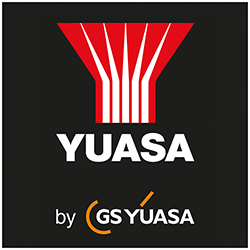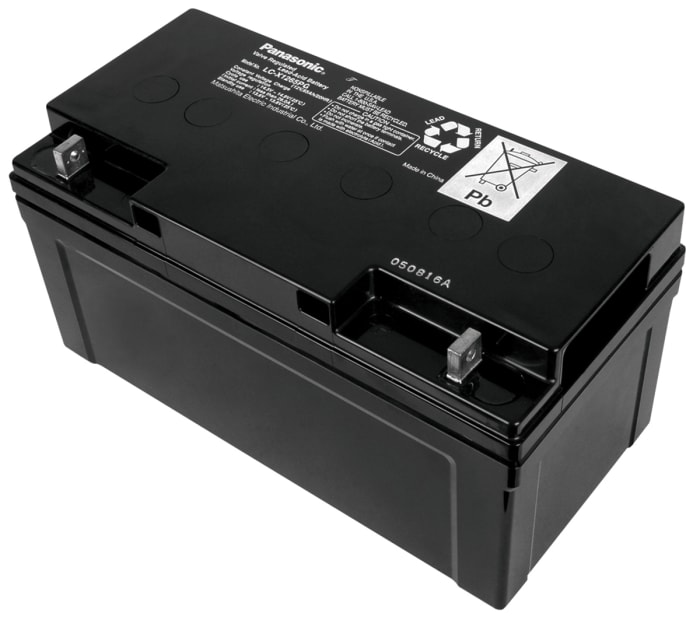Technical Document
Specifications
Brand
YuasaCapacity
66Ah
Nominal Voltage
12V
Construction
AGM
Terminal Type
M6
Flame Resistant
Yes
Dimensions
174 x 350 x 166mm
Designed for Cyclic Application
No
Application
Stand by Use
Designed High Rate Application
Yes
Chemistry
Lead Acid
Eurobat Classification
10 to 12 Years
Operating Temperature Range
-20 → +60°C
Weight
23kg
Country of Origin
United Kingdom
Product details
Yuasa Valve Regulated, Lead Acid Batteries - SWL Series
The Yuasa SWL series set the standard for quality and excellence in the field of rechargeable batteries. These high-quality batteries ensure that no electrolyte leakages occur from the case or terminals. The SWL series range is an enhanced version of the NPL series, resulting in an improved energy to density ratio, giving up to 40% extra discharge capacity.
Why would you buy the SWL Series?
These lead acid batteries offer a unique electrolyte suspension system incorporating a microfine glass mat (AGM) to retain the maximum amount of electrolyte in the cells. The valve regulated design of these batteries is equipped with a safe low-pressure venting system, which releases excess gases and automatically reseals should there be a build-up of gas within the battery due to overcharging.
Features and Benefits
• Sealed Lead Acid (SLA)
• Valve regulated
• High rate discharge performance
• Voltage: 12 V
• Rechargeable
• Flame retardant (FR) case option to UL94: V0
• Absorbed Glass Mat construction with no free acid (AGM)
• Case material: ABS
• Gas recombination
• Good recovery from deep discharge
• Operation in any orientation (excluding continuous inverted use)
• EUROBAT Classification: 10 to 12 years
• Compliant with IEC60896-21+22
Operating Temperature Range
• Range Storage (in fully charged condition) -20 °C to +60 °C
• Charge -15 °C to +50 °C
• Discharge -20 °C to +60 °C
Terminal Type
• M5 or M6 Female
Charger
• Chargers are available separately - Browse Yuasa battery chargers
SWL Series Available Options
• SWL1100-12FR, 39.6 Ah,12 V; RS stock no: 511-3505
• SWL1850-12FR, 66 Ah,12; RS stock no: 511-3511
Typical Applications
It can be used in any orientation except in a continuous inverted position. Designed for industrial use as float or standby power applications such as;
Alarm systems
Communications equipment
Control equipment
Emergency lighting systems
Medical equipment
Solar power systems
Uninterruptible power supplies
Gel Vs AGM Lead Acid Batteries
Absorbed Glass Mat
These batteries contain only enough liquid to keep the specially designed glass mat wet. The glass mat is made to wick the battery electrolytes between the battery plates. If the battery is broken no free liquid leaks out.
AGM batteries are preferred when a larger number of amps are required. The life expectancy remains excellent in most cases if they are not discharged more than 60% between recharges and/or recharged fully every 3-6 months.
Gel Cell Batteries
These batteries contain silica type gel, which is a thick paste-like material. It allows the electrons to flow between plates but will not leak in a gel battery if the case is broken.
Gel Cell Batteries don't offer the same power capacity as per the same physical size as AGM batteries. Gel cell batteries excel in slow discharge rates and slightly higher operating temperatures and with excellent deep cycle capability. Recharging these batteries must be done correctly or it will suffer premature failure.
FAQ's
Is a lead Acid Rechargeable Battery Harmful?
Lead-Acid batteries contain chemicals that have the potential to be harmful to both your health and the environment. They contain lead which is a highly toxic metal and sulfuric acid which is a corrosive electrolyte solution. Proper handling procedures must be followed always.
What state of charge will the battery be in when delivered?
The SWL series will have a charge, we do recommend charging prior to use.
How to dispose of Lead Acid Batteries?
Lead-acid batteries do contain hazardous chemicals, so recycling is the only way to dispose of them. Recycle responsibly. A wide range of schemes are available.
Supplied with
Terminal bolts
Warning
Do not charge in a sealed enclosure
Stock information temporarily unavailable.
Please check again later.
P.O.A.
1
P.O.A.
1
Technical Document
Specifications
Brand
YuasaCapacity
66Ah
Nominal Voltage
12V
Construction
AGM
Terminal Type
M6
Flame Resistant
Yes
Dimensions
174 x 350 x 166mm
Designed for Cyclic Application
No
Application
Stand by Use
Designed High Rate Application
Yes
Chemistry
Lead Acid
Eurobat Classification
10 to 12 Years
Operating Temperature Range
-20 → +60°C
Weight
23kg
Country of Origin
United Kingdom
Product details
Yuasa Valve Regulated, Lead Acid Batteries - SWL Series
The Yuasa SWL series set the standard for quality and excellence in the field of rechargeable batteries. These high-quality batteries ensure that no electrolyte leakages occur from the case or terminals. The SWL series range is an enhanced version of the NPL series, resulting in an improved energy to density ratio, giving up to 40% extra discharge capacity.
Why would you buy the SWL Series?
These lead acid batteries offer a unique electrolyte suspension system incorporating a microfine glass mat (AGM) to retain the maximum amount of electrolyte in the cells. The valve regulated design of these batteries is equipped with a safe low-pressure venting system, which releases excess gases and automatically reseals should there be a build-up of gas within the battery due to overcharging.
Features and Benefits
• Sealed Lead Acid (SLA)
• Valve regulated
• High rate discharge performance
• Voltage: 12 V
• Rechargeable
• Flame retardant (FR) case option to UL94: V0
• Absorbed Glass Mat construction with no free acid (AGM)
• Case material: ABS
• Gas recombination
• Good recovery from deep discharge
• Operation in any orientation (excluding continuous inverted use)
• EUROBAT Classification: 10 to 12 years
• Compliant with IEC60896-21+22
Operating Temperature Range
• Range Storage (in fully charged condition) -20 °C to +60 °C
• Charge -15 °C to +50 °C
• Discharge -20 °C to +60 °C
Terminal Type
• M5 or M6 Female
Charger
• Chargers are available separately - Browse Yuasa battery chargers
SWL Series Available Options
• SWL1100-12FR, 39.6 Ah,12 V; RS stock no: 511-3505
• SWL1850-12FR, 66 Ah,12; RS stock no: 511-3511
Typical Applications
It can be used in any orientation except in a continuous inverted position. Designed for industrial use as float or standby power applications such as;
Alarm systems
Communications equipment
Control equipment
Emergency lighting systems
Medical equipment
Solar power systems
Uninterruptible power supplies
Gel Vs AGM Lead Acid Batteries
Absorbed Glass Mat
These batteries contain only enough liquid to keep the specially designed glass mat wet. The glass mat is made to wick the battery electrolytes between the battery plates. If the battery is broken no free liquid leaks out.
AGM batteries are preferred when a larger number of amps are required. The life expectancy remains excellent in most cases if they are not discharged more than 60% between recharges and/or recharged fully every 3-6 months.
Gel Cell Batteries
These batteries contain silica type gel, which is a thick paste-like material. It allows the electrons to flow between plates but will not leak in a gel battery if the case is broken.
Gel Cell Batteries don't offer the same power capacity as per the same physical size as AGM batteries. Gel cell batteries excel in slow discharge rates and slightly higher operating temperatures and with excellent deep cycle capability. Recharging these batteries must be done correctly or it will suffer premature failure.
FAQ's
Is a lead Acid Rechargeable Battery Harmful?
Lead-Acid batteries contain chemicals that have the potential to be harmful to both your health and the environment. They contain lead which is a highly toxic metal and sulfuric acid which is a corrosive electrolyte solution. Proper handling procedures must be followed always.
What state of charge will the battery be in when delivered?
The SWL series will have a charge, we do recommend charging prior to use.
How to dispose of Lead Acid Batteries?
Lead-acid batteries do contain hazardous chemicals, so recycling is the only way to dispose of them. Recycle responsibly. A wide range of schemes are available.
Supplied with
Terminal bolts
Warning
Do not charge in a sealed enclosure


